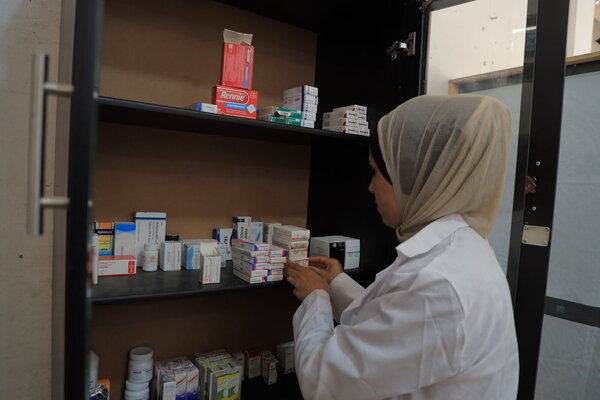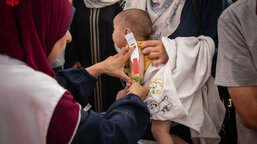“Surgeries are performed without anaesthesia. There are no antibiotics, and painkillers are missing,” describes Jan Líska, staff member of Caritas Czech Republic. After two years of conflict in the Gaza Strip, the civilian population is facing extraordinarily difficult conditions.
Medicines and drinking water are scarce in Gaza. Healthcare is completely disrupted, and hospitals are operating in a very limited capacity. “People walk for hours hoping to find at least a sliver of safety,” adds Jan Líska, who recently returned from a work trip to Israel and the Palestinian West Bank with his colleague Jakub Blinka, a project coordinator for Gaza. In this interview, both share what it is like to carry out humanitarian work under a long-term blockade and why, even in an environment of utter despair, there remains room for solidarity.

Photo: Jakub Blinka and Jan Líska from Caritas Czech Republic in an interview for ČT24. Source: ČT24
You recently returned from a work trip. What is the current situation in Jerusalem and the West Bank?
Jakub: Upon arriving in Israel, life seemed entirely normal. Israeli children played carefree, and couples watched films together. All of this is happening just a few kilometres from war, the despair of ordinary people, and a complete lack of basic necessities. However, conversations with locals reveal deep concerns about the future - particularly due to the expansion of illegal Israeli settlements and settler attacks on Palestinian villages and farmland.
Jan: Relying solely on the media for information can be misleading. When we speak with our partners from Caritas Jerusalem and the Sawa organisation, we realise the situation is much more complex. I am amazed that our colleagues are able to find solutions even in such difficult conditions.
Is there a moment from the trip you will never forget?
Jakub: On our second evening, after a demanding day, we went for a walk and saw a flag in the Jewish quarter of Jerusalem’s Old City that read “Make Gaza Jewish Again.” I was prepared for a lot, but such an open call for ethnic cleansing in a public space truly shocked me.
Caritas Czech Republic launched a fundraising campaign to support Gaza immediately after the conflict broke out. Has the nature of the assistance provided by Caritas changed? What is most urgently needed today?
Jakub: From the outset, Caritas Czech Republic has focused primarily on supporting primary healthcare and providing psychosocial support. But practically everything is needed—due to the blockade, only very limited supplies and medicines reach Gaza.
Jan: Every resource is scarce in Gaza today—drinking water, food, tents, and medical supplies. Petrol is a precious commodity. When it runs out, hospitals stop functioning.
A clinic supported by Caritas was recently forced to close. Can you describe its story and its importance to the local population?
Jakub: This clinic in Gaza City provided primary healthcare, and its greatest added value, compared to similar facilities, was the ability to dispense a wide range of medicines even in these hard times. That is why it was recommended by other humanitarian organisations.
Jan: In Gaza, Caritas Jerusalem supports a total of ten medical facilities, one of which is co-funded by Caritas Czech Republic. Evacuating this specific clinic was very complicated, but thanks to good coordination among all involved, a new location was identified, and the clinic has now reopened in a safer neighbourhood in central Gaza.

Photo: In addition to basic treatment, the clinic in Gaza City provided a wide range of medicines.
One of the pillars of assistance is psychosocial support. Is the Sawa´s crisis helpline still functioning? How is it doing?
Jakub: Sawa continues to provide psychological support via a telephone helpline and is functioning very well. The challenge lies with complex cases, such as individuals with suicidal thoughts who require face-to-face contact and follow-up care. That is currently difficult—transport is often impossible, and the capacity of support workers is limited. Caritas Czech Republic has two social workers in the field dealing with these cases, but their capacity is also very limited.
Jan: One of our female colleagues had to be evacuated recently. She was literally saving her life—throwing her belongings out of a window onto the street and picking them up, but she had no way to transport them. Petrol costs astronomical amounts, so people take only what they can carry. They walk for up to twelve hours to a place where there is no bombing at the moment. Yet they do not even know if they will find a place to camp.
Let us return to your visit to Palestine. What did you see on the West Bank? What does daily life and humanitarian work look like there?
Jakub: There is great tension on the West Bank between Israeli settlers and Palestinian residents, including Bedouins. We visited the Christian village of Taybeh, where our partner runs a health centre. The fact that it is a Christian community provides some protection against attacks. We also visited Ramallah, where we did not encounter similar incidents.
Jan: Attacks by Jewish settlers are increasingly frequent. One could say they happen daily. If you are Palestinian and live outside a city, you lose your livelihood, for example, by being unable to graze livestock, farm your fields, or tend your olive grove. Settler attacks often result in serious injuries; your life may even be in danger.
What are the main obstacles preventing Caritas and local partners from providing more effective aid in Gaza?
Jakub: The biggest issue is the blockade. If it were at least partially lifted, aid delivery would be much easier. Another major limitation is the lack of financial resources. Prices on the black market have skyrocketed. Very few people can afford things we consider completely ordinary.
Jan: Humanitarian aid is being provided under wartime conditions. The aforementioned blockade results in a lack of nearly everything and leads to a rise in prices of whatever goods do reach the Gaza Strip. Another issue is that Israel uses entities such as the Gaza Humanitarian Foundation (GHF) for aid distribution, which do not adhere to basic humanitarian principles. Food distribution is chaotic—not only does it fail to reach all those in need, but Israeli soldiers have fired weapons to disperse crowds, resulting in many deaths. The functioning of these two parallel systems is a major obstacle. If Israel allowed the standard system to operate fully, the humanitarian situation would significantly improve.

Photo: People are surviving in harsh conditions in makeshift tents and ruined homes.
Caritas plans to train local helpline workers in cooperation with Linka bezpečí. What will this cooperation look like?
Jakub: The aim is to transfer Czech expertise in operating a crisis helpline to the Palestinian organisation Sawa. Linka bezpěčí has been operating in our country for several decades and will share its expertise with Sawa through online training sessions, providing interpretation from Czech to Arabic. The topics were selected based on the specific needs of the Sawa organisation.
Did locals tell you anything that left an indelible impression?
Jakub: I remember a story we heard during our visit to Sawa. One man found himself in an utterly hopeless situation. He had no food, no shelter, and was unable to care for his young son. He decided to go with his son to Israeli positions where fighting was taking place, intending to end his life. His plan failed, and the man continues to suffer. Unfortunately, such stories are all too common.
Caritas Czech Republic has recently prepared a travelling photo exhibition titled Gaza Beyond the Headlines, featuring authentic stories of people from the clinic in Gaza. What do you think is hidden behind those headlines?
Jan: Behind the headlines lies the incredible suffering of people just like you and me. These are not just numbers from TV news, but real individuals who want just one thing—to survive.
Jakub: It is currently impossible to connect with people in Gaza directly. Much of the information is relayed second-hand, and the stories of ordinary people get lost in the flood of daily news. However, we know from our colleagues that some of the individuals whose faces and stories appear in the exhibition were later injured. The harsh reality does not spare even medical personnel—our colleagues experience the same hardships as their patients.
On Thursday, 9 October, a ceasefire between Israel and Hamas was announced. For many, it represents a glimmer of hope that the violence might finally end. Humanitarian organisations, including Caritas Czech Republic, hope this ceasefire will allow for safer and more extensive delivery of aid to the Gaza Strip. This interview was conducted before the ceasefire was announced.
Monthly highlights picked just for you!











